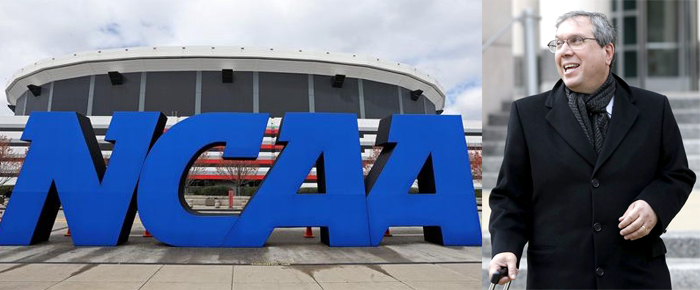
By Julie Buehler
While you enjoy spring football updates and the starts of March Madness, it’s important to pay attention to a once-quiet, slow reverberation for change becoming increasingly louder. Because soon, the drum beat for NCAA reform is going to pound an irreparable hole through the senseless exploitation of collegiate athletes and change our nation’s most passionate pastime forever.
The day after Selection Sunday, a man named Jeff Kessler selected that day to file an anti-trust lawsuit against the NCAA.
He went to court on Monday, St. Patrick’s Day, in an attempt to slow the engorged green river of cash flowing endlessly into the NCAA reservoir.
The NCAA has contracts worth more than $16 billion with CBS and Turner Sports and ESPN for the rights to men’s basketball and football playoffs, that run for 14 and 12 years respectively and while the NCAA collects those billions, the thousands of athletes that will be playing in those games are restricted from collecting funds beyond strict guidelines the NCAA lays out called scholarships.
Kessler’s lawsuit is not a call to pay collegiate players, as some other lawsuits against the NCAA have suggested to rectify the situation, instead, Kessler’s lawsuit is simpler in the idea that it seeks relief from NCAA restrictions arguing the players worth has been artificially capped at the price of a scholarship.
“The main objective is to strike down, permanently, the restrictions that prevent athletes in Division I basketball and the top tier college football from being fairly compensated for the billions of dollars in revenues that they help generate,” Kessler told an ESPN reporter. “In no other business—and college sports is big business – would it ever be suggested that the people who are providing the essential services work for free. Only in big-time college sports is that line drawn.”
In the 50’s, the NCAA started making money on TV deals and despite encouragement from Congress, ignored calls to ensure the excessive commercialization didn’t create excessive authority of the institution.
And actually, even well before that, it was clear to onlookers that there was a problem with the system as early at 1929.
In a look at the history of the NCAA according to the Marquette Law Review, the early years of the organization were productive in creating safer rules, organizing schedules and such. But according to this report, “In 1929, the highly respected Carnegie Foundation for the Advancement of Education issued a significant report regarding intercollegiate athletics and made the following finding:
‘[A] change of values is needed in a field that is sodden with the commercial and the material and the vested interests that these forces have created. Commercialism in college athletics must be diminished and college sport must rise to a point where it is esteemed primarily and sincerely for the opportunities it affords to mature youth.’ ”
That was 1929. How much worse is it now that the commercialism is more than a billion dollars a year to the NCAA, I haven’t even addressed how much each school nets off the players. And we’ll leave that for another column, this is a HUGE topic, we’ll keep it simple.
The difference between this Kessler lawsuit and others is that it does NOT seek damages for the players, but instead asked for the NCAA to take the restrictions off. Allow athletes in the 5 major conferences (SEC, Big-10, Big-12, ACC and Pac-12) to simply procure funding on the open market. That means endorsement deals, autograph signings, and Trojan players are no longer punished for Reggie Bush’s parents living arrangements.
“We’re looking to change the system. That’s the main goal,” Kessler said. “We want the market for players to emerge.”
In the summer of 2012, I had Ramogi Huma, former UCLA linebacker and long-time collegiate player advocate on my radio show to discuss this drum beat to reform the NCAA, institute a fair, market-driven system rather than the restrictive, exploitive system the NCAA employs now and allow players to control their own future, not some suits thousands of miles away.
It’s refreshing to see the topics that were heavily debated some decade ago and even in 2012 when I presented them on my sports talk radio show are beginning to reach the consciousness of the college sports fan.
While some are willing to accept the injustices of a broken system to avoid facing an unknown in reform, it’s important to understand the NCAA has hidden it’s commercialization behind a thinly veiled word called amateurism, and that veil was being exposed as early as 1929! How much worse is it now??
Time for change.
I commend Kessler and his team for forging this path and expect radical reform to be set forth in the next 2 years. Smart people can work on a good system, but first we much clear out all the stupidity that’s been allowed for too long.
Julie Buehler hosts the Coachella Valley’s most popular sports talk radio show, “Buehler’s Day Off” every day from 3-6 on 1010 KXPS, the valley’s all sports station. She’s an avid gym rat, slightly sarcastic and more likely to recite Steve Young’s career passing stats than American Idol winners. Tune in M-F 3-6 pst at www.team1010.com or watch the show on Ustream.












































